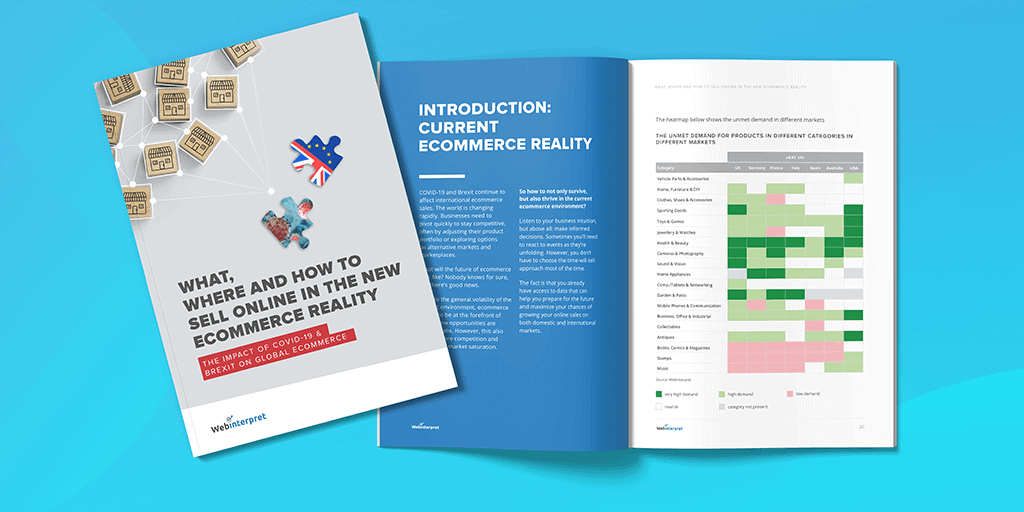
The impact of Brexit on global ecommerce: all you need to know
The impact of Brexit on ecommerce and UK-EU trade in 2021 did not go unnoticed: at the start of 2021 exports to the EU plunged by 68%.
However, the initial disruption was an unlikely prophesy of what online sellers could expect in the future. In fact, in the long term we see no massive blow to the ecommerce sector as both the UK and the EU are strong ecommerce markets.
In this article you’ll read about:
- The initial disruption to UK-EU trade after Brexit became reality
- How UK & EU ecommerce businesses have been reacting to Brexit-related changes
- What to expect in the uncertain future.
Want to sell more on eBay after Covid-19 & Brexit? Download our FREE report!
Brexit & ecommerce: the initial disruption
After Brexit became reality, it immediately impacted UK businesses, especially in ecommerce. According to the Road Haulage Association, exports to the EU plunged 68% in the month after Brexit.
At Webinterpret, we observed the following impact of Brexit on ecommerce sales in the UK:
- Starting from late December 2020 and January 2021: even though there were no major changes in the visibility of international products in search results, CTR and product page views, the sales rate (transactions / product page views), and ultimately the sales, dropped significantly by 30-40%.
- The lower number of transactions was caused by the buyers’ fear of additional charges (VAT or duties).
All the same, the initial disruption around the begininng of 2021 doesn’t show the whole picture of what the post-Brexit ecommerce reality may look like.
In fact, it’s still too early to assess the full impact of Brexit on ecommerce since we need concrete data for a longer period of time.
The truth is that we can only wait, watch and stay proactive in mitigating risks and identifying opportunities.
Post-Brexit VAT and customs procedures impact many ecommerce businesses
The most relevant sections of the post-Brexit UK-EU trade deal for ecommerce businesses pertain to the customs declaration forms, EORI numbers, customs tariffs based on country of origin and the changes in VAT.
When the cost of the product is below £135, the VAT is levied at the point of sale. When the product is worth over £135, VAT is paid at the point of delivery.
The necessity to pay VAT and complete customs declarations have made UK-EU trade less straightforward and less cost-efficient.
According to a recent survey of 57 UK luxury brands, there’s been widespread disappointment with shipping delays and extra costs (even though many brands are absorbing the extra costs: something impossible for smaller brands).
The bottom line:
Many EU customers are not willing to pay extra. As a result, some UK ecommerce brands have stopped selling to the EU and are losing loyal customers as it’s no longer financially viable and causes paperwork headaches.
When it comes to both ecommerce in the UK and ecommerce in Europe, things may of course change in the future when the new post-Brexit reality becomes more predictable or better regulated.
It’s worth noting that there are also UK companies who decided to prepare in advance for the worst version of Brexit. For instance, some opened warehouses and fulfilment hubs on Continental Europe to avoid the tax and logistical implications.
For example, Joseph Joseph, a popular homeware brand, opened a warehouse in the Netherlands and kicked off a migration project in August 2020. According to Charlotte Cau, head of performance marketing at Joseph Joseph:
As B2B had already successfully migrated part of its fulfilment to the EU, it was a fairly straightforward process for B2C. We were also able to rely on our German entity for VAT registration and it’s something we’re closely monitoring in case we go over the threshold in certain EU countries.
Such actions take time, but they can pay off in the long term.
Things are no different for EU businesses selling to UK customers. Many small ecommerce businesses located in the EU have stopped selling to their UK-based customers. Some are planning to open UK warehouses or start selling via large ecommerce platforms, such as eBay or Amazon.
To alleviate the Brexit challenges, consider setting up warehouses closer to customers and/or finding alternative suppliers.
Ecommerce in the UK and ecommerce in the EU will carry on
Currently many ecommerce sellers continue to express disappointment with the disruptive character of Brexit and the lack of clear guidance. However, while Brexit has caused temporary disruptions, in the long term it may not turn out to be a massive blow to the ecommerce sector.
Worth over £220 billion, the UK is considered to be the third biggest ecommerce market globally. Last year, UK businesses saw a 57% increase in worldwide ecommerce sales. Similarly, the EU has some of the largest ecommerce markets in the world, e.g. in Germany and France.
The fact is that online shopping both in the UK and the EU is massive and this is unlikely to change any time soon.
According to Mike Bishop, CEO at Webinterpret:
Commerce and collaboration between the UK, the EU and the rest of the world will continue. It may have started off with a period of disruption and a degree of chaos, but it will work in the long term.
However, it’s important to take a proactive approach and be ready for any potential disruption, e.g. by ensuring that you have enough/excess stock. If you trade across borders, relocating inventory to warehouses closer to your customers may make sense, too.
Finally, remember that Brexit is also about ecommerce opportunities, especially in cross-border trade. Many manufacturers will have a chance to become competitive abroad. Some sellers can improve profitability if they watch the currency situation closely and use the right moment to sell with a higher margin. There may be further benefits, depending on pricing.
Brexit & ecommerce: conclusion
During challenging times, such as Brexit, staying proactive is essential, especially if the future feels uncertain.
Offering products on a number of marketplaces and international markets often allows sellers to plan and balance the sales between markets, spread their risk and make the most of diversification.
The exact impact of Brexit on business is yet to be known.
Yet a multichannel and multimarket sales strategy provides sellers with more opportunities as well as options in the event of adversities and unexpected developments.

Download our FREE report & sell more after Brexit!
Related Posts:
Ecommerce Newsletter
By clicking the “Subscribe now” button, you agree to receive our monthly e-mail newsletter and regular marketing and commercial communications by email from Webinterpret regarding marketing trends and our digital marketing services. You confirm that you have read and agreed to Webinterpret’s Terms of Service and Privacy Policy.



